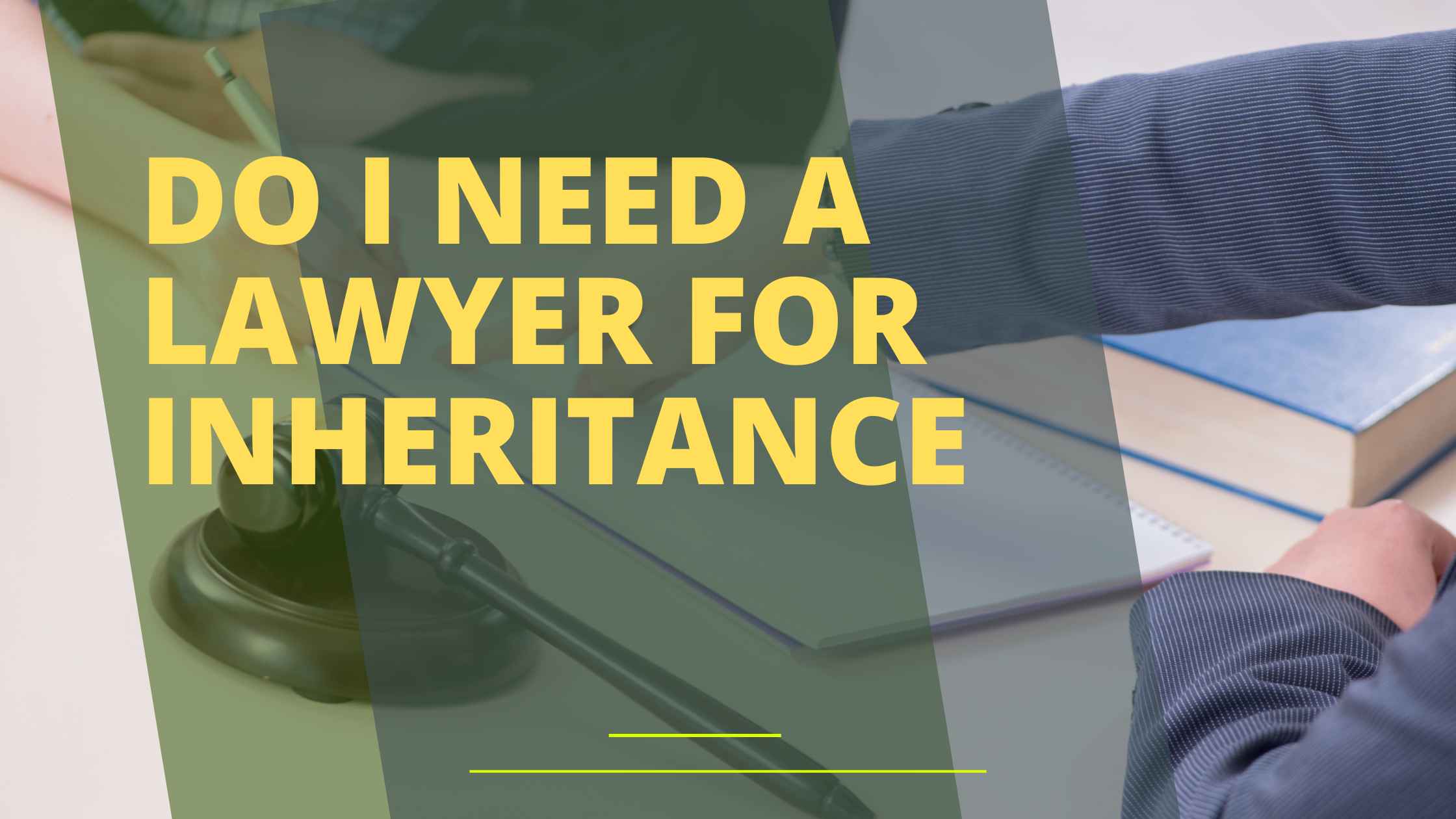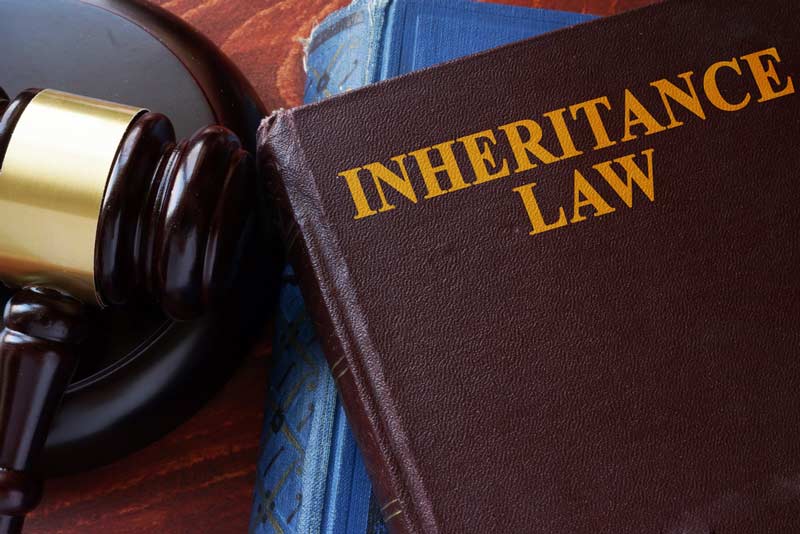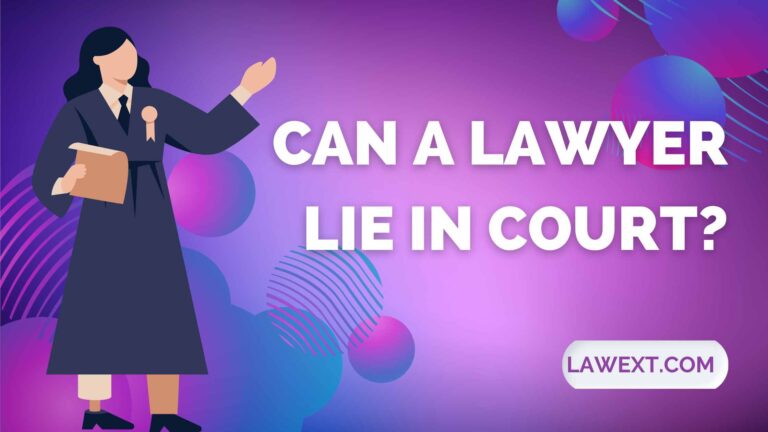Do I Need a Lawyer for Inheritance

Yes, hiring a lawyer is essential for inheritance matters.
When Do You Need A Lawyer?
When it comes to handling inheritance matters, many people wonder if they really need a lawyer. While not every situation requires legal assistance, there are certain circumstances where it is advisable to seek professional help. Here are some scenarios in which you may want to consider consulting with a lawyer:
Complicated Or Disputed Inheritance
Inheritance matters can become complex and contentious, especially when there are multiple beneficiaries involved or when the distribution of assets is disputed. If you find yourself in a situation where the inheritance process seems overwhelming or there are disagreements among family members, it is recommended to engage the services of a lawyer.
A lawyer experienced in inheritance laws can help mediate disputes, resolve conflicts, and ensure a fair distribution of assets. They can also navigate through the complexities of probate court proceedings, if necessary, to protect your interests.
Estate Planning And Will Preparation
Estate planning and will preparation are essential aspects of inheritance. If you have considerable assets or property, it is highly recommended to consult with a lawyer to ensure your wishes are properly documented and legally binding.
A lawyer specializing in estate planning can assist you in drafting a comprehensive will that clearly outlines your intentions for asset distribution. They can also advise on strategies to minimize potential conflicts and taxes, protecting the stability and continuity of your estate for future generations.
Tax And Legal Implications
Inheritance can have significant tax and legal implications, particularly for larger estates or when complex financial arrangements are involved. Consulting with a lawyer who specializes in inheritance tax and estate laws can help you navigate these complexities with ease.
A knowledgeable lawyer will ensure that you understand your tax obligations and can identify potential risks or opportunities for tax savings. They will assist in optimizing the distribution of assets while minimizing tax liabilities, safeguarding your inheritance for both your immediate and future beneficiaries.

Credit: www.debt.org
Benefits Of Hiring A Lawyer
When dealing with inheritance matters, it’s essential to consider whether hiring a lawyer is necessary. While it may seem possible to navigate the legal processes alone, enlisting the help of a skilled lawyer offers several benefits that can streamline the entire procedure and provide peace of mind.
Expertise And Experience
Lawyers specializing in inheritance matters possess the necessary expertise and experience to efficiently handle complex legal issues. They are well-versed in probate laws and are skilled at creating strategies to navigate intricate family dynamics, ensuring that the wishes of the deceased are honored and assets are distributed fairly.
Navigating Legal Procedures
Professional lawyers have a comprehensive understanding of the intricate legal procedures involved in the inheritance process. They guide families through the complexities of estate administration, probate court proceedings, and inheritance tax laws, ensuring that all necessary documents are filed accurately and on time.
Avoiding Costly Mistakes
One of the most significant advantages of hiring a lawyer for inheritance matters is the ability to avoid costly mistakes. Lawyers can ensure that all legal requirements are met, preventing potential disputes and minimizing the risk of financial losses or unnecessary delays in the distribution of assets.
Steps To Take Without A Lawyer
Yes, you can handle inheritance matters without a lawyer by understanding the legal process, gathering necessary documents, and communicating with beneficiaries. Researching state laws and seeking professional advice if needed can help you navigate the complexities of inheritance without the immediate need for legal representation.
When it comes to dealing with an inheritance, you may be wondering if you need a lawyer to assist you with the process. While there are situations where legal advice may be necessary, there are several steps you can take on your own to navigate the inheritance process. By following these important steps, you can ensure that you handle your inheritance efficiently and effectively.
Research And Educate Yourself
One of the first steps to take when dealing with an inheritance without a lawyer is to research and educate yourself about the laws and regulations surrounding inheritances. Understanding the legal framework can help you make informed decisions and avoid potential pitfalls. Take the time to read up on inheritance laws in your jurisdiction and gather information from reliable sources.
Gather Important Documents
Another crucial step is to gather all the important documents related to the inheritance. This includes wills, trusts, and any other legal documents that outline the distribution of assets. It is essential to keep these documents safe and organized, as they will be essential for the inheritance process. Create a digital and physical file with all the necessary paperwork, making it easier to access when needed.
Consult With Family Members
Consulting with family members is an important part of handling an inheritance. Reach out to other beneficiaries and heirs to discuss the inheritance and gather their input. This can help foster open communication and prevent misunderstandings or conflicts down the line. By involving family members, you can work together to ensure a fair and smooth distribution of assets.
Consider Alternative Dispute Resolution
In some cases, disagreements or conflicts may arise during the inheritance process. If you encounter such situations, it is important to consider alternative dispute resolution methods, such as mediation or arbitration. These methods can help resolve disputes amicably outside of the courtroom, saving both time and money. By exploring alternative options, you may be able to find a mutually satisfactory solution.
Seek Legal Advice If Necessary
Although it is possible to handle an inheritance without a lawyer, there may be situations where seeking legal advice becomes necessary. If the inheritance involves complex legal issues, substantial assets, or disagreements that can’t be resolved amicably, it is advisable to consult with an experienced estate lawyer. They can provide you with professional guidance and ensure that you navigate the legal landscape effectively.

Credit: www.mylawquestions.com
How To Find The Right Lawyer
When it comes to dealing with inheritance matters, hiring a lawyer who specializes in probate and estate law can help guide you through the complex legal process. Finding the right lawyer for your specific needs is crucial to ensure a smooth and successful outcome. Here are some steps you can take to find the right lawyer for your inheritance case:
Ask For Referrals
Seeking referrals from trusted sources is a great way to start your search for a reliable lawyer. You can ask friends, family members, or other professionals, such as financial advisors or accountants, if they have any recommendations. Personal referrals can give you valuable insights into the lawyer’s competence, professionalism, and reliability.
Research And Compare
After receiving referrals, it is important to conduct your own research and compare the options. Look for information about the lawyer’s experience, expertise in inheritance law, and success rates with similar cases. Take into consideration their reputation, qualifications, and any online reviews or testimonials from past clients. Narrow down your choices to the lawyers who specialize in probate and estate law.
Interview Potential Lawyers
Once you have a shortlist of potential lawyers, it’s time to conduct interviews to assess their suitability for your case. During the interviews, ask about their experience with inheritance cases, their approach to handling such matters, and the strategies they would use in your particular situation. Pay attention to their communication skills, responsiveness, and ability to explain complex legal concepts in a clear and understandable manner.
Consider Fees And Billing
Before finalizing your decision, it’s essential to discuss and clarify the lawyer’s fees and billing structure. Inquire about their hourly rates, retainer fees, and any additional costs that may arise during the course of your case. Understanding the financial aspects upfront will help prevent any surprises or misunderstandings later on.
Trust Your Instincts
In addition to technical qualifications and experience, it’s important to trust your instincts when selecting a lawyer. Consider whether you feel comfortable communicating and working with the lawyer you are considering. Building a good rapport and feeling confident in the lawyer’s abilities can go a long way in ensuring a smooth collaboration and positive outcome.

Credit: haileypettylaw.com
Conclusion
Seeking legal advice for inheritance matters can provide valuable guidance and protection. With the complexity of estate laws and potential family disputes, having a lawyer can help you navigate the process smoothly. By understanding your rights and the legal implications, a lawyer can safeguard your interests and ensure a fair distribution of assets.
Introducing Jonah Plum, a legal luminary whose journey through the corridors of justice has been intertwined with the eloquence of the written word. Born and raised in the vibrant city of Seattle, Washington, Jonah's early fascination with language and debate laid the foundation for a remarkable career in law.
Jonah's scholarly odyssey began at Harvard Law School, where they immersed themselves in the study of jurisprudence, honing their analytical prowess and legal acumen. Armed with a law degree, they entered the legal arena, navigating courtrooms and boardrooms with a fervor for justice. Yet, it was the realization of the transformative power of the written word that led Jonah to pivot from legal briefs to the world of blogging.
A digital advocate in the truest sense, Jonah recognized the need for demystifying legal concepts and making them accessible to a broader audience. This blog, a virtual repository of legal insights, transcends geographical boundaries, connecting with a global readership hungry for clarity amidst legal complexities.
Beyond the black letter of the law, Jonah delves into the human stories that underscore the legal landscape. Their writing goes beyond legal analysis, weaving narratives that humanize the law, shedding light on its impact on individuals and society.






